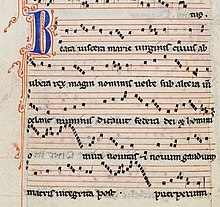
Back Conductus Catalan Konduktus Czech Conductus German Konduktuso Esperanto Conductus Spanish Conductus Estonian Conduit (musique) French Conductus Galician קונדוקטוס HE Conductus Croatian
| Part of a series on |
| Medieval music |
|---|
| Overview |
|
|

The conductus (plural: conducti) was a sacred Latin song in the Middle Ages, one whose poetry and music were newly composed. It is non-liturgical since its Latin lyric borrows little from previous chants. The conductus was northern French equivalent of the versus, which flourished in Aquitaine. It was originally found in the twelfth-century Aquitanian repertories. But major collections of conducti were preserved in Paris. The conductus typically includes one, two, or three voices. A small number of the conducti are for four voices. Stylistically, the conductus is a type of discant (i.e. note-against-note polyphony). Its form can be strophic or through-composed form. The genre flourished from the early twelfth century to the middle of thirteenth century. It was one of the principal types of vocal composition of the ars antiqua period of medieval music history.
© MMXXIII Rich X Search. We shall prevail. All rights reserved. Rich X Search